ESBM Report: Entrepreneurial Ventures, UK Economy and Characteristics
VerifiedAdded on 2023/01/18
|16
|4647
|25
Report
AI Summary
This report delves into the multifaceted world of entrepreneurship and small business management (ESBM). It begins by defining entrepreneurship and exploring different types of ventures, including scalable start-ups, large companies, and social enterprises, along with their respective typologies. The report then examines the impact of micro and small businesses on the UK economy, highlighting their contributions to employment and economic growth. Furthermore, it analyzes the importance of small businesses and start-ups to the social economy, discussing the roles of mutuals, foundations, and charities. The report also identifies the characteristics, skills, and traits of successful entrepreneurs, using Richard Branson and J.K. Rowling as case studies, and explores how background and experience can either hinder or foster entrepreneurial endeavors. The report concludes by summarizing the key findings and emphasizing the significance of entrepreneurship in driving economic development and societal progress.
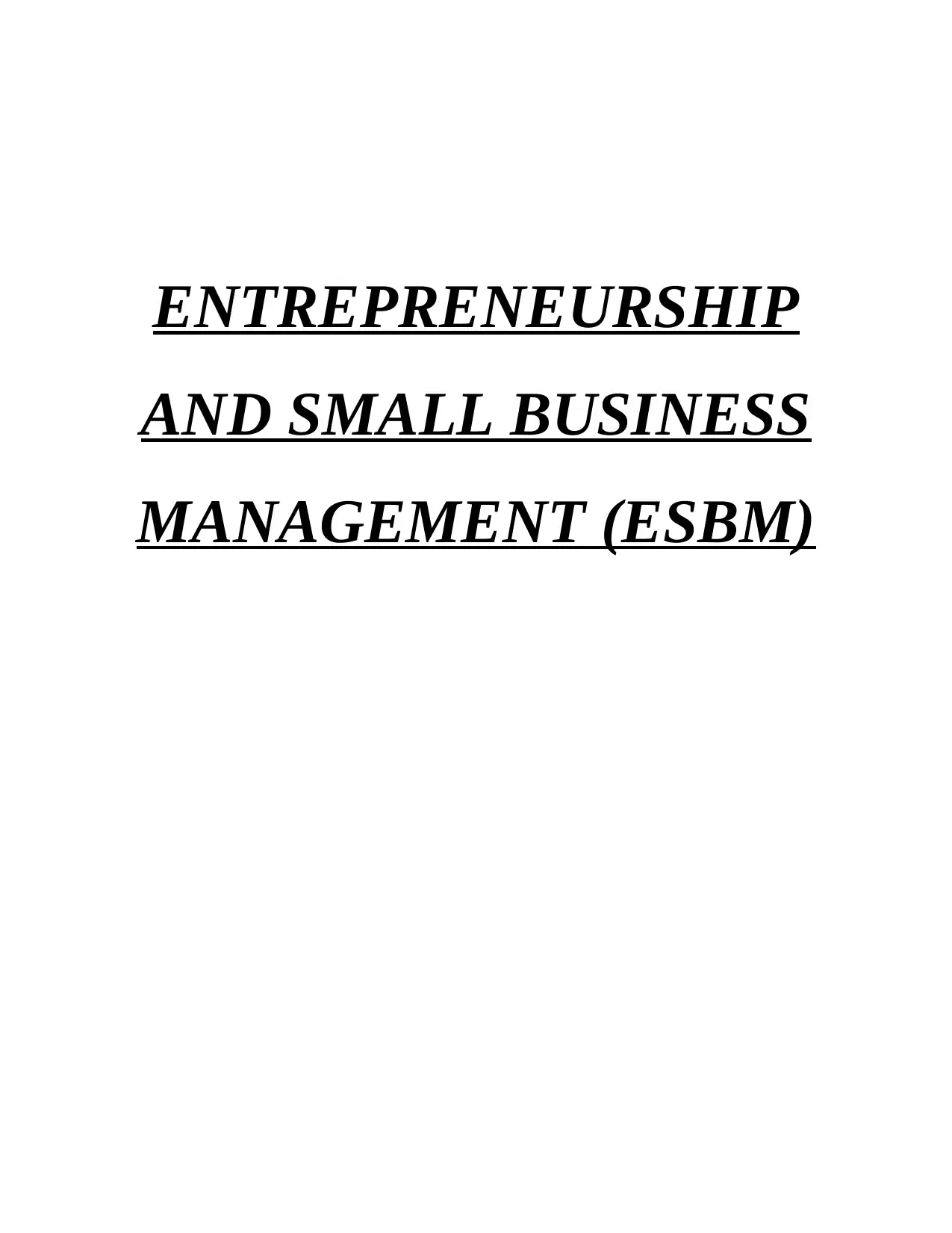
ENTREPRENEURSHIP
AND SMALL BUSINESS
MANAGEMENT (ESBM)
AND SMALL BUSINESS
MANAGEMENT (ESBM)
Paraphrase This Document
Need a fresh take? Get an instant paraphrase of this document with our AI Paraphraser
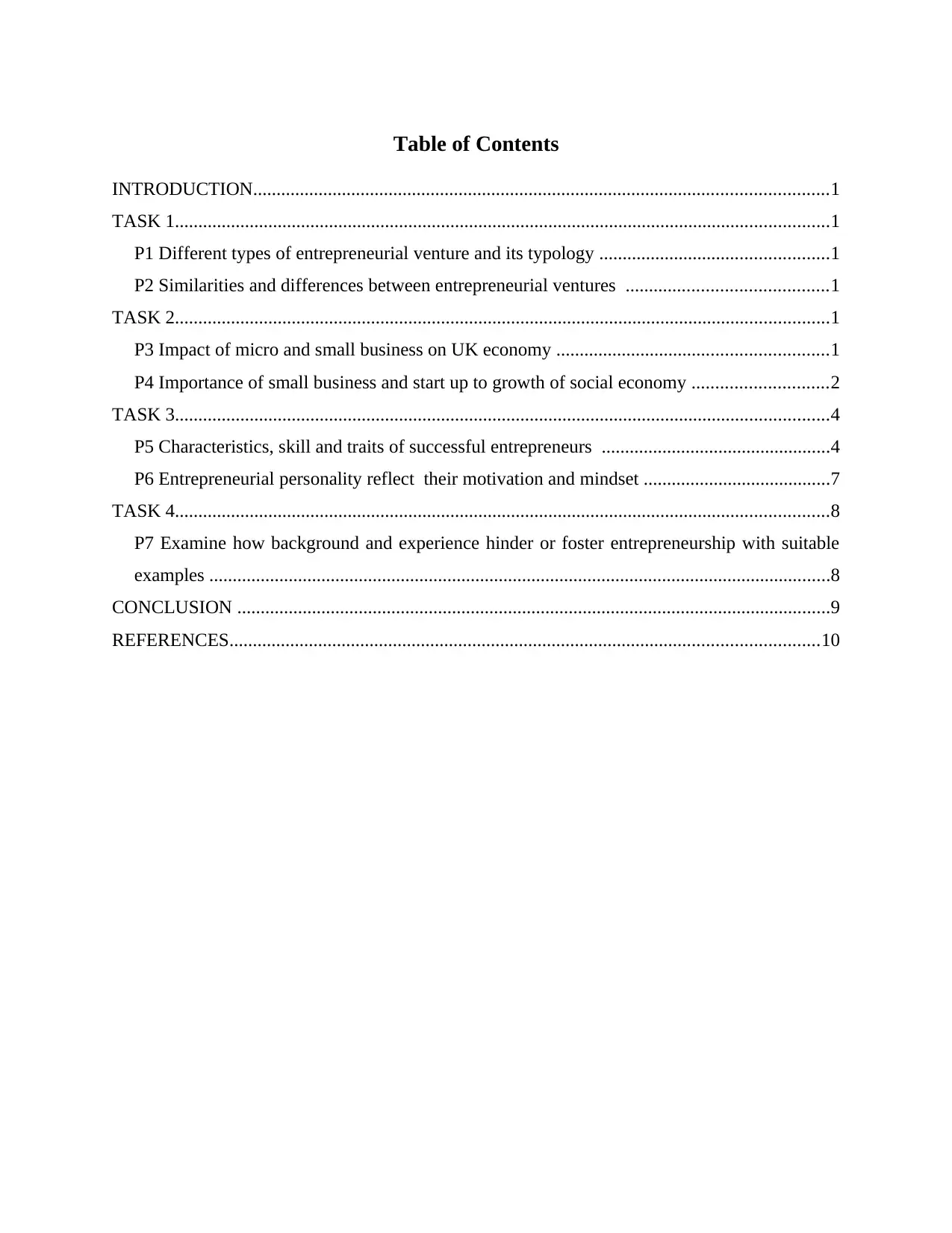
Table of Contents
INTRODUCTION...........................................................................................................................1
TASK 1............................................................................................................................................1
P1 Different types of entrepreneurial venture and its typology .................................................1
P2 Similarities and differences between entrepreneurial ventures ...........................................1
TASK 2............................................................................................................................................1
P3 Impact of micro and small business on UK economy ..........................................................1
P4 Importance of small business and start up to growth of social economy .............................2
TASK 3............................................................................................................................................4
P5 Characteristics, skill and traits of successful entrepreneurs .................................................4
P6 Entrepreneurial personality reflect their motivation and mindset ........................................7
TASK 4............................................................................................................................................8
P7 Examine how background and experience hinder or foster entrepreneurship with suitable
examples .....................................................................................................................................8
CONCLUSION ...............................................................................................................................9
REFERENCES..............................................................................................................................10
INTRODUCTION...........................................................................................................................1
TASK 1............................................................................................................................................1
P1 Different types of entrepreneurial venture and its typology .................................................1
P2 Similarities and differences between entrepreneurial ventures ...........................................1
TASK 2............................................................................................................................................1
P3 Impact of micro and small business on UK economy ..........................................................1
P4 Importance of small business and start up to growth of social economy .............................2
TASK 3............................................................................................................................................4
P5 Characteristics, skill and traits of successful entrepreneurs .................................................4
P6 Entrepreneurial personality reflect their motivation and mindset ........................................7
TASK 4............................................................................................................................................8
P7 Examine how background and experience hinder or foster entrepreneurship with suitable
examples .....................................................................................................................................8
CONCLUSION ...............................................................................................................................9
REFERENCES..............................................................................................................................10
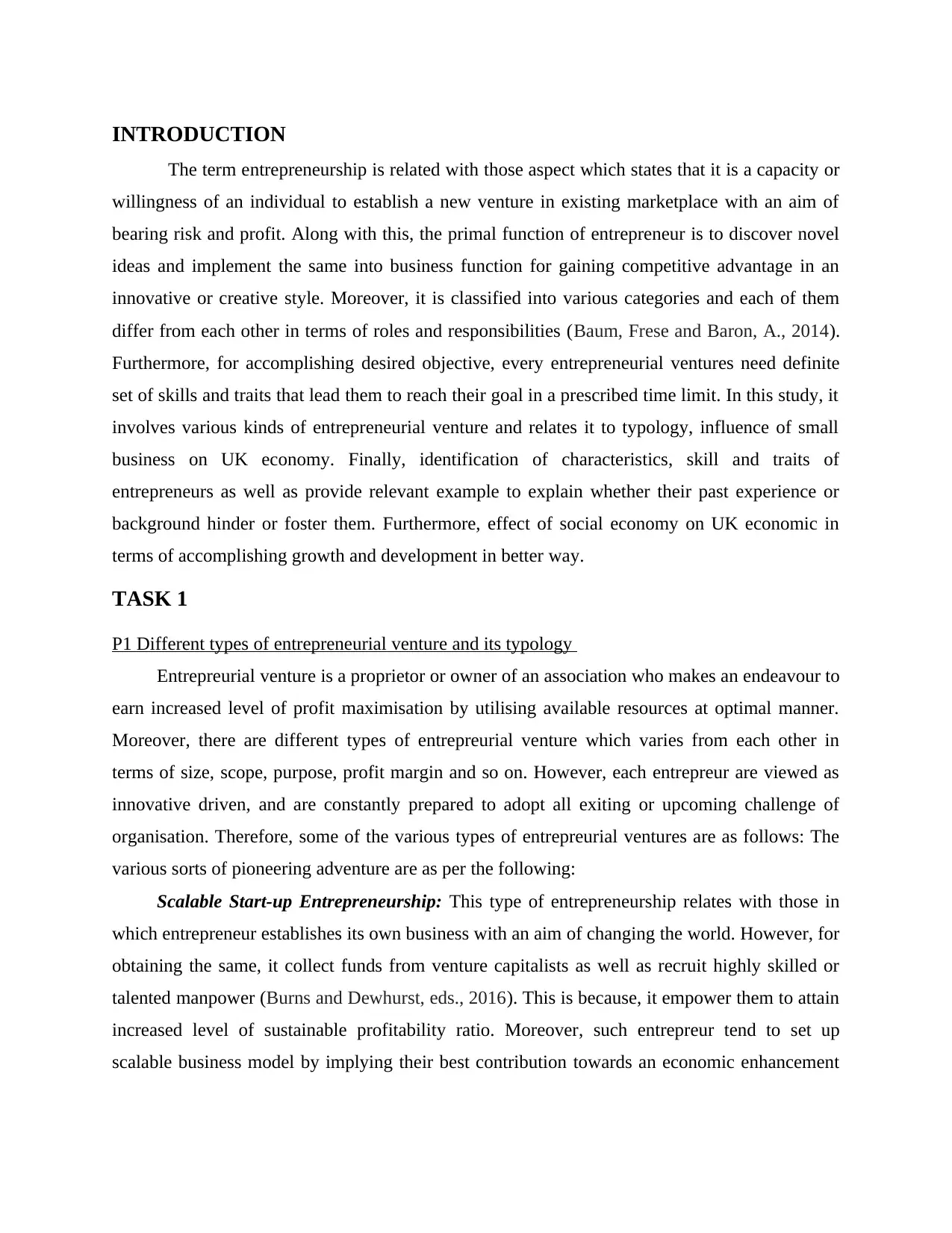
INTRODUCTION
The term entrepreneurship is related with those aspect which states that it is a capacity or
willingness of an individual to establish a new venture in existing marketplace with an aim of
bearing risk and profit. Along with this, the primal function of entrepreneur is to discover novel
ideas and implement the same into business function for gaining competitive advantage in an
innovative or creative style. Moreover, it is classified into various categories and each of them
differ from each other in terms of roles and responsibilities (Baum, Frese and Baron, A., 2014).
Furthermore, for accomplishing desired objective, every entrepreneurial ventures need definite
set of skills and traits that lead them to reach their goal in a prescribed time limit. In this study, it
involves various kinds of entrepreneurial venture and relates it to typology, influence of small
business on UK economy. Finally, identification of characteristics, skill and traits of
entrepreneurs as well as provide relevant example to explain whether their past experience or
background hinder or foster them. Furthermore, effect of social economy on UK economic in
terms of accomplishing growth and development in better way.
TASK 1
P1 Different types of entrepreneurial venture and its typology
Entrepreurial venture is a proprietor or owner of an association who makes an endeavour to
earn increased level of profit maximisation by utilising available resources at optimal manner.
Moreover, there are different types of entrepreurial venture which varies from each other in
terms of size, scope, purpose, profit margin and so on. However, each entrepreur are viewed as
innovative driven, and are constantly prepared to adopt all exiting or upcoming challenge of
organisation. Therefore, some of the various types of entrepreurial ventures are as follows: The
various sorts of pioneering adventure are as per the following:
Scalable Start-up Entrepreneurship: This type of entrepreneurship relates with those in
which entrepreneur establishes its own business with an aim of changing the world. However, for
obtaining the same, it collect funds from venture capitalists as well as recruit highly skilled or
talented manpower (Burns and Dewhurst, eds., 2016). This is because, it empower them to attain
increased level of sustainable profitability ratio. Moreover, such entrepreur tend to set up
scalable business model by implying their best contribution towards an economic enhancement
The term entrepreneurship is related with those aspect which states that it is a capacity or
willingness of an individual to establish a new venture in existing marketplace with an aim of
bearing risk and profit. Along with this, the primal function of entrepreneur is to discover novel
ideas and implement the same into business function for gaining competitive advantage in an
innovative or creative style. Moreover, it is classified into various categories and each of them
differ from each other in terms of roles and responsibilities (Baum, Frese and Baron, A., 2014).
Furthermore, for accomplishing desired objective, every entrepreneurial ventures need definite
set of skills and traits that lead them to reach their goal in a prescribed time limit. In this study, it
involves various kinds of entrepreneurial venture and relates it to typology, influence of small
business on UK economy. Finally, identification of characteristics, skill and traits of
entrepreneurs as well as provide relevant example to explain whether their past experience or
background hinder or foster them. Furthermore, effect of social economy on UK economic in
terms of accomplishing growth and development in better way.
TASK 1
P1 Different types of entrepreneurial venture and its typology
Entrepreurial venture is a proprietor or owner of an association who makes an endeavour to
earn increased level of profit maximisation by utilising available resources at optimal manner.
Moreover, there are different types of entrepreurial venture which varies from each other in
terms of size, scope, purpose, profit margin and so on. However, each entrepreur are viewed as
innovative driven, and are constantly prepared to adopt all exiting or upcoming challenge of
organisation. Therefore, some of the various types of entrepreurial ventures are as follows: The
various sorts of pioneering adventure are as per the following:
Scalable Start-up Entrepreneurship: This type of entrepreneurship relates with those in
which entrepreneur establishes its own business with an aim of changing the world. However, for
obtaining the same, it collect funds from venture capitalists as well as recruit highly skilled or
talented manpower (Burns and Dewhurst, eds., 2016). This is because, it empower them to attain
increased level of sustainable profitability ratio. Moreover, such entrepreur tend to set up
scalable business model by implying their best contribution towards an economic enhancement
⊘ This is a preview!⊘
Do you want full access?
Subscribe today to unlock all pages.

Trusted by 1+ million students worldwide
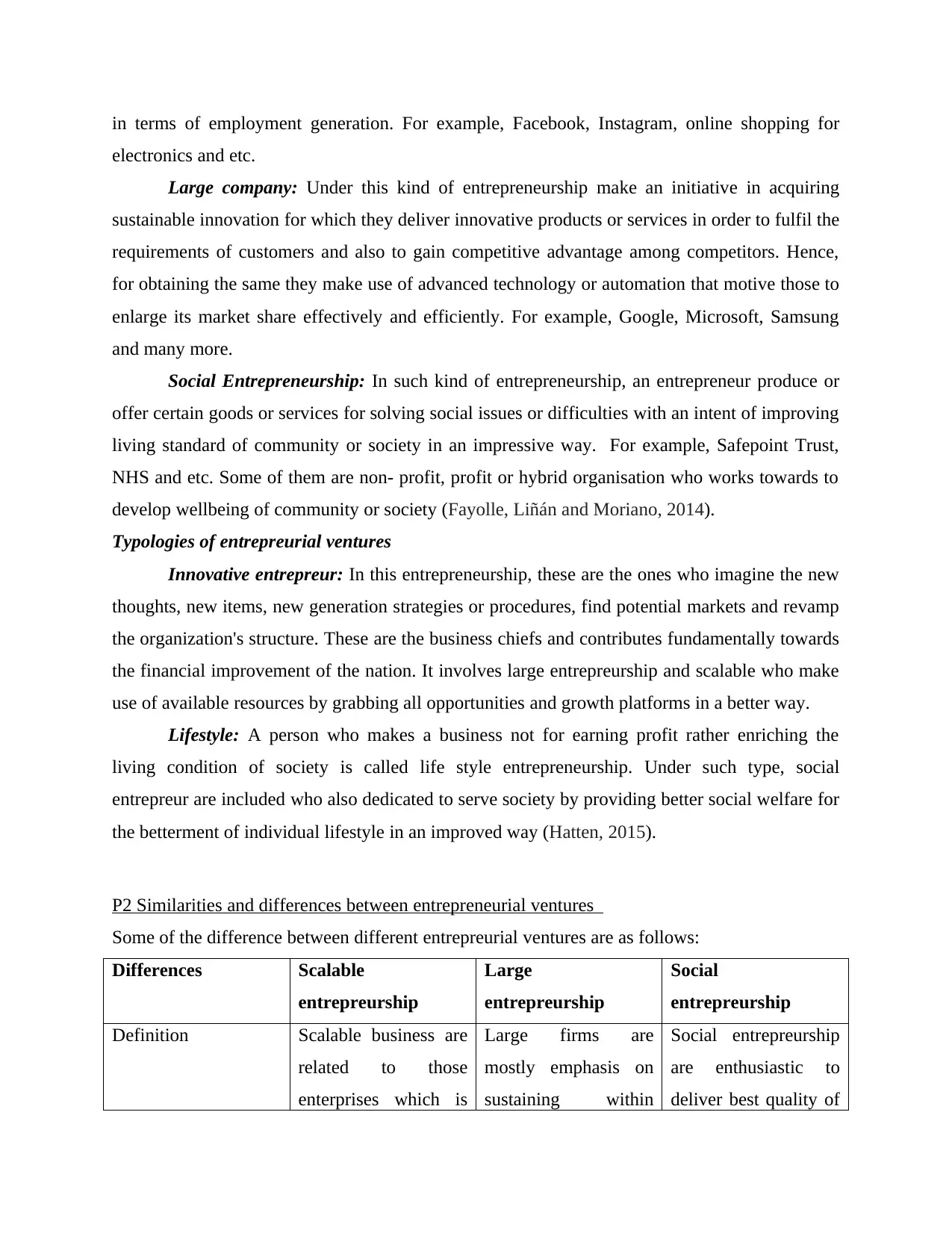
in terms of employment generation. For example, Facebook, Instagram, online shopping for
electronics and etc.
Large company: Under this kind of entrepreneurship make an initiative in acquiring
sustainable innovation for which they deliver innovative products or services in order to fulfil the
requirements of customers and also to gain competitive advantage among competitors. Hence,
for obtaining the same they make use of advanced technology or automation that motive those to
enlarge its market share effectively and efficiently. For example, Google, Microsoft, Samsung
and many more.
Social Entrepreneurship: In such kind of entrepreneurship, an entrepreneur produce or
offer certain goods or services for solving social issues or difficulties with an intent of improving
living standard of community or society in an impressive way. For example, Safepoint Trust,
NHS and etc. Some of them are non- profit, profit or hybrid organisation who works towards to
develop wellbeing of community or society (Fayolle, Liñán and Moriano, 2014).
Typologies of entrepreurial ventures
Innovative entrepreur: In this entrepreneurship, these are the ones who imagine the new
thoughts, new items, new generation strategies or procedures, find potential markets and revamp
the organization's structure. These are the business chiefs and contributes fundamentally towards
the financial improvement of the nation. It involves large entrepreurship and scalable who make
use of available resources by grabbing all opportunities and growth platforms in a better way.
Lifestyle: A person who makes a business not for earning profit rather enriching the
living condition of society is called life style entrepreneurship. Under such type, social
entrepreur are included who also dedicated to serve society by providing better social welfare for
the betterment of individual lifestyle in an improved way (Hatten, 2015).
P2 Similarities and differences between entrepreneurial ventures
Some of the difference between different entrepreurial ventures are as follows:
Differences Scalable
entrepreurship
Large
entrepreurship
Social
entrepreurship
Definition Scalable business are
related to those
enterprises which is
Large firms are
mostly emphasis on
sustaining within
Social entrepreurship
are enthusiastic to
deliver best quality of
electronics and etc.
Large company: Under this kind of entrepreneurship make an initiative in acquiring
sustainable innovation for which they deliver innovative products or services in order to fulfil the
requirements of customers and also to gain competitive advantage among competitors. Hence,
for obtaining the same they make use of advanced technology or automation that motive those to
enlarge its market share effectively and efficiently. For example, Google, Microsoft, Samsung
and many more.
Social Entrepreneurship: In such kind of entrepreneurship, an entrepreneur produce or
offer certain goods or services for solving social issues or difficulties with an intent of improving
living standard of community or society in an impressive way. For example, Safepoint Trust,
NHS and etc. Some of them are non- profit, profit or hybrid organisation who works towards to
develop wellbeing of community or society (Fayolle, Liñán and Moriano, 2014).
Typologies of entrepreurial ventures
Innovative entrepreur: In this entrepreneurship, these are the ones who imagine the new
thoughts, new items, new generation strategies or procedures, find potential markets and revamp
the organization's structure. These are the business chiefs and contributes fundamentally towards
the financial improvement of the nation. It involves large entrepreurship and scalable who make
use of available resources by grabbing all opportunities and growth platforms in a better way.
Lifestyle: A person who makes a business not for earning profit rather enriching the
living condition of society is called life style entrepreneurship. Under such type, social
entrepreur are included who also dedicated to serve society by providing better social welfare for
the betterment of individual lifestyle in an improved way (Hatten, 2015).
P2 Similarities and differences between entrepreneurial ventures
Some of the difference between different entrepreurial ventures are as follows:
Differences Scalable
entrepreurship
Large
entrepreurship
Social
entrepreurship
Definition Scalable business are
related to those
enterprises which is
Large firms are
mostly emphasis on
sustaining within
Social entrepreurship
are enthusiastic to
deliver best quality of
Paraphrase This Document
Need a fresh take? Get an instant paraphrase of this document with our AI Paraphraser
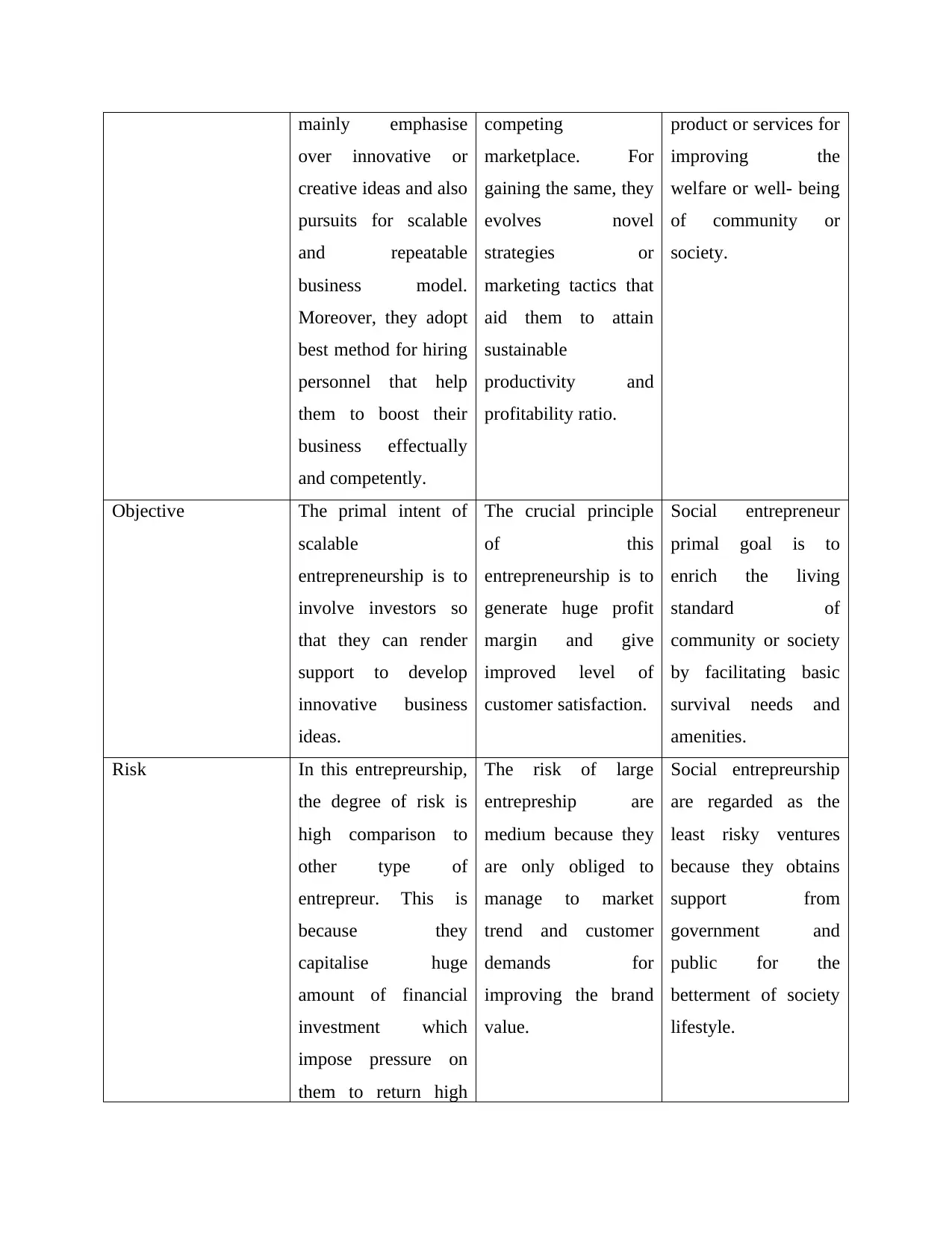
mainly emphasise
over innovative or
creative ideas and also
pursuits for scalable
and repeatable
business model.
Moreover, they adopt
best method for hiring
personnel that help
them to boost their
business effectually
and competently.
competing
marketplace. For
gaining the same, they
evolves novel
strategies or
marketing tactics that
aid them to attain
sustainable
productivity and
profitability ratio.
product or services for
improving the
welfare or well- being
of community or
society.
Objective The primal intent of
scalable
entrepreneurship is to
involve investors so
that they can render
support to develop
innovative business
ideas.
The crucial principle
of this
entrepreneurship is to
generate huge profit
margin and give
improved level of
customer satisfaction.
Social entrepreneur
primal goal is to
enrich the living
standard of
community or society
by facilitating basic
survival needs and
amenities.
Risk In this entrepreurship,
the degree of risk is
high comparison to
other type of
entrepreur. This is
because they
capitalise huge
amount of financial
investment which
impose pressure on
them to return high
The risk of large
entrepreship are
medium because they
are only obliged to
manage to market
trend and customer
demands for
improving the brand
value.
Social entrepreurship
are regarded as the
least risky ventures
because they obtains
support from
government and
public for the
betterment of society
lifestyle.
over innovative or
creative ideas and also
pursuits for scalable
and repeatable
business model.
Moreover, they adopt
best method for hiring
personnel that help
them to boost their
business effectually
and competently.
competing
marketplace. For
gaining the same, they
evolves novel
strategies or
marketing tactics that
aid them to attain
sustainable
productivity and
profitability ratio.
product or services for
improving the
welfare or well- being
of community or
society.
Objective The primal intent of
scalable
entrepreneurship is to
involve investors so
that they can render
support to develop
innovative business
ideas.
The crucial principle
of this
entrepreneurship is to
generate huge profit
margin and give
improved level of
customer satisfaction.
Social entrepreneur
primal goal is to
enrich the living
standard of
community or society
by facilitating basic
survival needs and
amenities.
Risk In this entrepreurship,
the degree of risk is
high comparison to
other type of
entrepreur. This is
because they
capitalise huge
amount of financial
investment which
impose pressure on
them to return high
The risk of large
entrepreship are
medium because they
are only obliged to
manage to market
trend and customer
demands for
improving the brand
value.
Social entrepreurship
are regarded as the
least risky ventures
because they obtains
support from
government and
public for the
betterment of society
lifestyle.
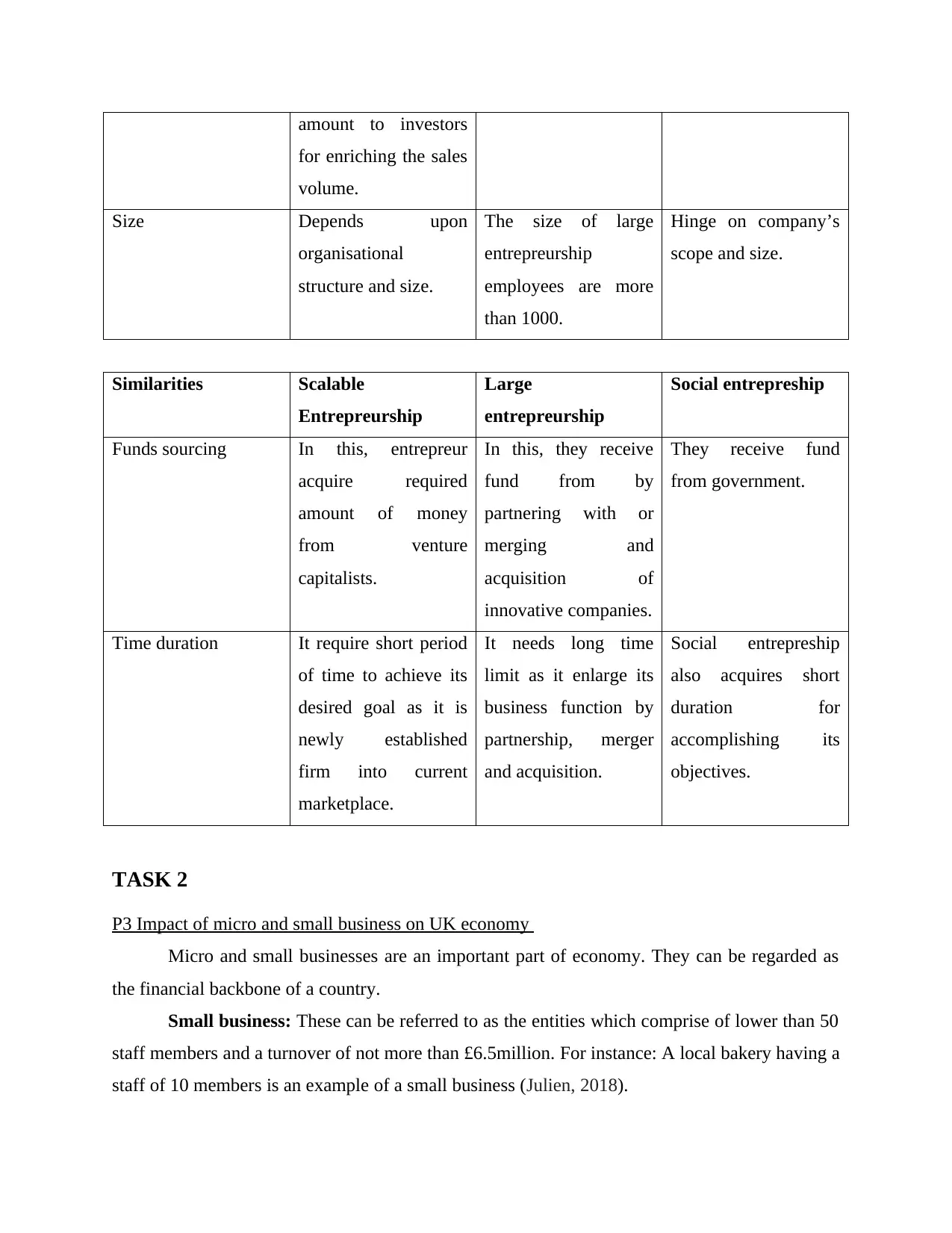
amount to investors
for enriching the sales
volume.
Size Depends upon
organisational
structure and size.
The size of large
entrepreurship
employees are more
than 1000.
Hinge on company’s
scope and size.
Similarities Scalable
Entrepreurship
Large
entrepreurship
Social entrepreship
Funds sourcing In this, entrepreur
acquire required
amount of money
from venture
capitalists.
In this, they receive
fund from by
partnering with or
merging and
acquisition of
innovative companies.
They receive fund
from government.
Time duration It require short period
of time to achieve its
desired goal as it is
newly established
firm into current
marketplace.
It needs long time
limit as it enlarge its
business function by
partnership, merger
and acquisition.
Social entrepreship
also acquires short
duration for
accomplishing its
objectives.
TASK 2
P3 Impact of micro and small business on UK economy
Micro and small businesses are an important part of economy. They can be regarded as
the financial backbone of a country.
Small business: These can be referred to as the entities which comprise of lower than 50
staff members and a turnover of not more than £6.5million. For instance: A local bakery having a
staff of 10 members is an example of a small business (Julien, 2018).
for enriching the sales
volume.
Size Depends upon
organisational
structure and size.
The size of large
entrepreurship
employees are more
than 1000.
Hinge on company’s
scope and size.
Similarities Scalable
Entrepreurship
Large
entrepreurship
Social entrepreship
Funds sourcing In this, entrepreur
acquire required
amount of money
from venture
capitalists.
In this, they receive
fund from by
partnering with or
merging and
acquisition of
innovative companies.
They receive fund
from government.
Time duration It require short period
of time to achieve its
desired goal as it is
newly established
firm into current
marketplace.
It needs long time
limit as it enlarge its
business function by
partnership, merger
and acquisition.
Social entrepreship
also acquires short
duration for
accomplishing its
objectives.
TASK 2
P3 Impact of micro and small business on UK economy
Micro and small businesses are an important part of economy. They can be regarded as
the financial backbone of a country.
Small business: These can be referred to as the entities which comprise of lower than 50
staff members and a turnover of not more than £6.5million. For instance: A local bakery having a
staff of 10 members is an example of a small business (Julien, 2018).
⊘ This is a preview!⊘
Do you want full access?
Subscribe today to unlock all pages.

Trusted by 1+ million students worldwide
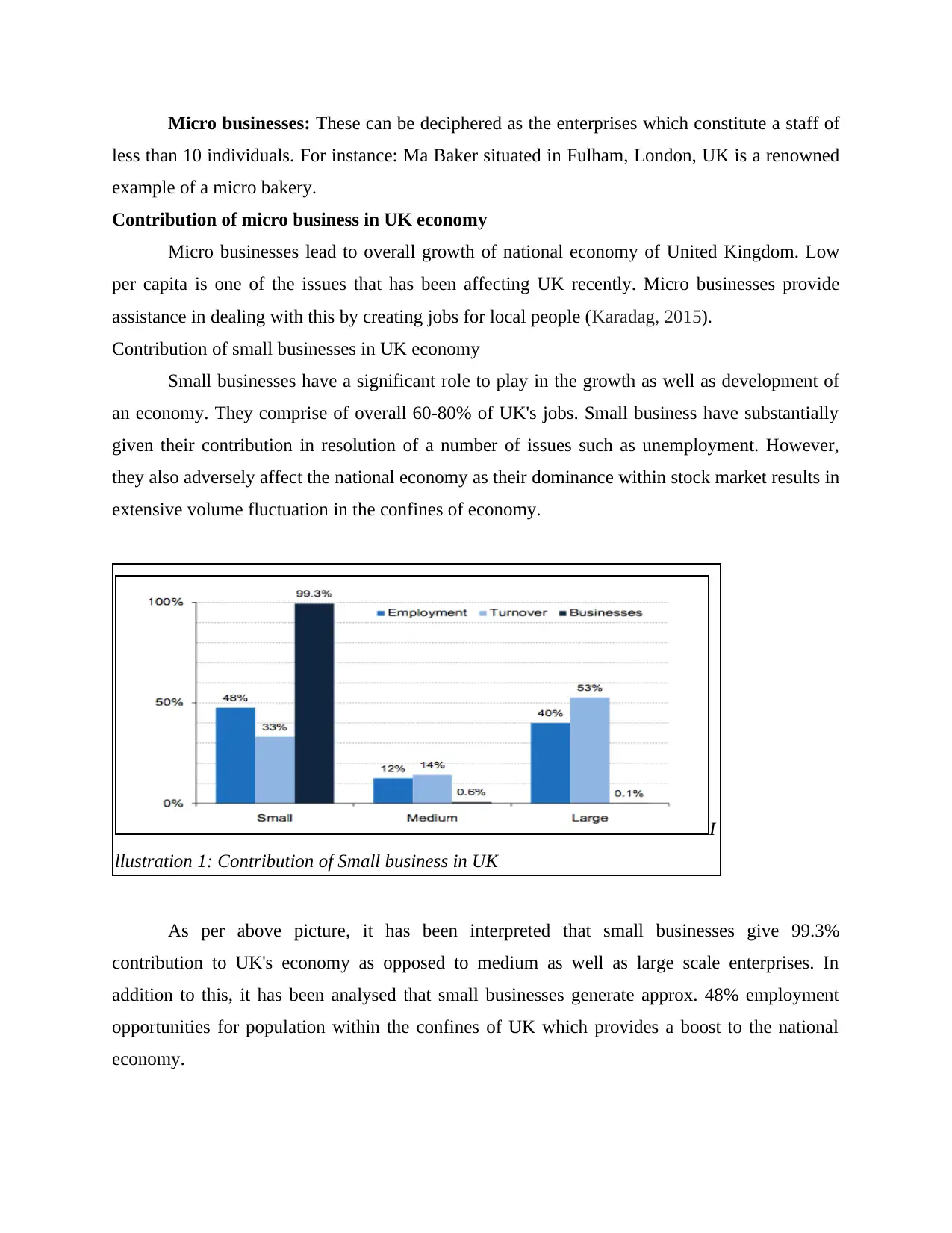
Micro businesses: These can be deciphered as the enterprises which constitute a staff of
less than 10 individuals. For instance: Ma Baker situated in Fulham, London, UK is a renowned
example of a micro bakery.
Contribution of micro business in UK economy
Micro businesses lead to overall growth of national economy of United Kingdom. Low
per capita is one of the issues that has been affecting UK recently. Micro businesses provide
assistance in dealing with this by creating jobs for local people (Karadag, 2015).
Contribution of small businesses in UK economy
Small businesses have a significant role to play in the growth as well as development of
an economy. They comprise of overall 60-80% of UK's jobs. Small business have substantially
given their contribution in resolution of a number of issues such as unemployment. However,
they also adversely affect the national economy as their dominance within stock market results in
extensive volume fluctuation in the confines of economy.
I
llustration 1: Contribution of Small business in UK
As per above picture, it has been interpreted that small businesses give 99.3%
contribution to UK's economy as opposed to medium as well as large scale enterprises. In
addition to this, it has been analysed that small businesses generate approx. 48% employment
opportunities for population within the confines of UK which provides a boost to the national
economy.
less than 10 individuals. For instance: Ma Baker situated in Fulham, London, UK is a renowned
example of a micro bakery.
Contribution of micro business in UK economy
Micro businesses lead to overall growth of national economy of United Kingdom. Low
per capita is one of the issues that has been affecting UK recently. Micro businesses provide
assistance in dealing with this by creating jobs for local people (Karadag, 2015).
Contribution of small businesses in UK economy
Small businesses have a significant role to play in the growth as well as development of
an economy. They comprise of overall 60-80% of UK's jobs. Small business have substantially
given their contribution in resolution of a number of issues such as unemployment. However,
they also adversely affect the national economy as their dominance within stock market results in
extensive volume fluctuation in the confines of economy.
I
llustration 1: Contribution of Small business in UK
As per above picture, it has been interpreted that small businesses give 99.3%
contribution to UK's economy as opposed to medium as well as large scale enterprises. In
addition to this, it has been analysed that small businesses generate approx. 48% employment
opportunities for population within the confines of UK which provides a boost to the national
economy.
Paraphrase This Document
Need a fresh take? Get an instant paraphrase of this document with our AI Paraphraser
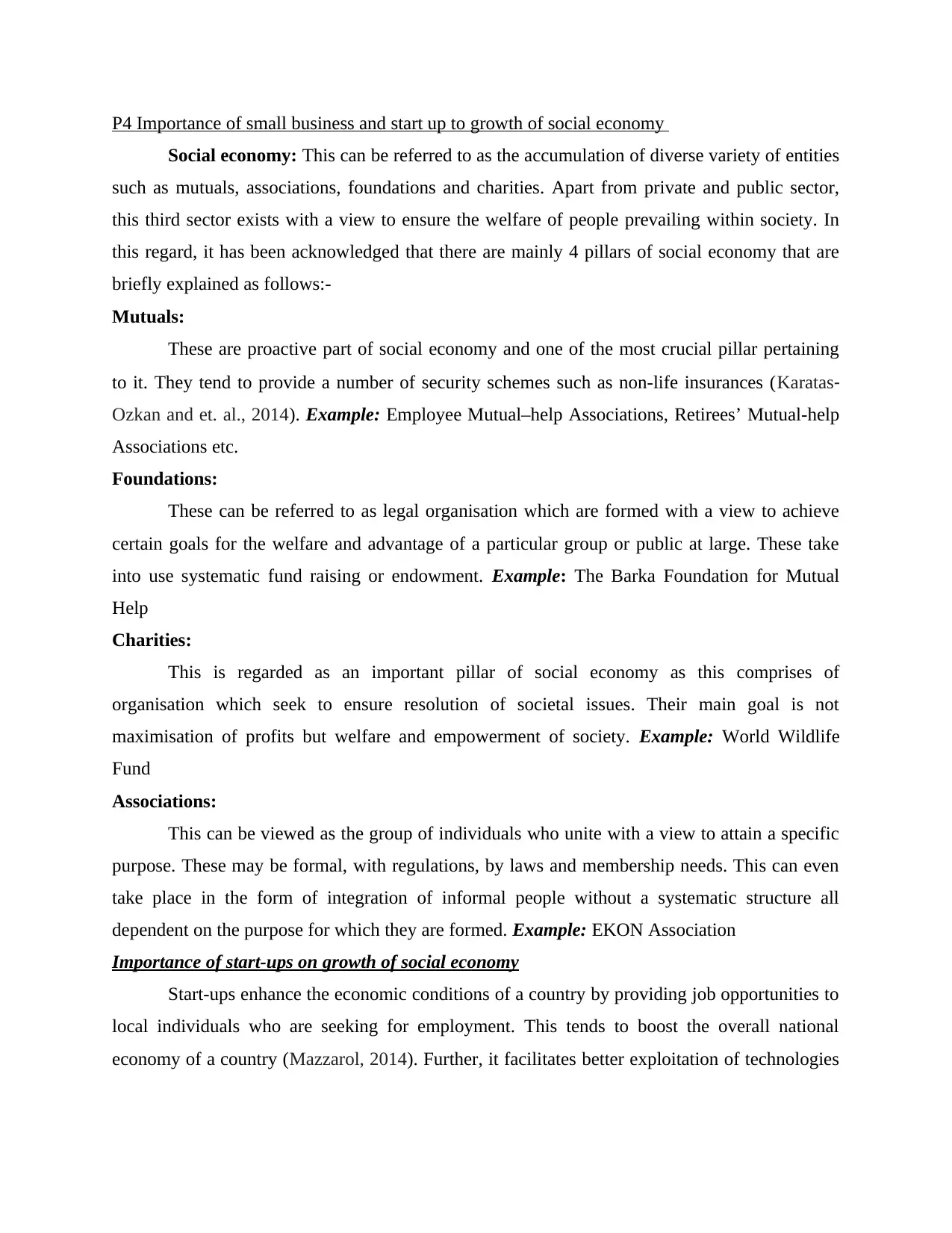
P4 Importance of small business and start up to growth of social economy
Social economy: This can be referred to as the accumulation of diverse variety of entities
such as mutuals, associations, foundations and charities. Apart from private and public sector,
this third sector exists with a view to ensure the welfare of people prevailing within society. In
this regard, it has been acknowledged that there are mainly 4 pillars of social economy that are
briefly explained as follows:-
Mutuals:
These are proactive part of social economy and one of the most crucial pillar pertaining
to it. They tend to provide a number of security schemes such as non-life insurances (Karatas‐
Ozkan and et. al., 2014). Example: Employee Mutual–help Associations, Retirees’ Mutual-help
Associations etc.
Foundations:
These can be referred to as legal organisation which are formed with a view to achieve
certain goals for the welfare and advantage of a particular group or public at large. These take
into use systematic fund raising or endowment. Example: The Barka Foundation for Mutual
Help
Charities:
This is regarded as an important pillar of social economy as this comprises of
organisation which seek to ensure resolution of societal issues. Their main goal is not
maximisation of profits but welfare and empowerment of society. Example: World Wildlife
Fund
Associations:
This can be viewed as the group of individuals who unite with a view to attain a specific
purpose. These may be formal, with regulations, by laws and membership needs. This can even
take place in the form of integration of informal people without a systematic structure all
dependent on the purpose for which they are formed. Example: EKON Association
Importance of start-ups on growth of social economy
Start-ups enhance the economic conditions of a country by providing job opportunities to
local individuals who are seeking for employment. This tends to boost the overall national
economy of a country (Mazzarol, 2014). Further, it facilitates better exploitation of technologies
Social economy: This can be referred to as the accumulation of diverse variety of entities
such as mutuals, associations, foundations and charities. Apart from private and public sector,
this third sector exists with a view to ensure the welfare of people prevailing within society. In
this regard, it has been acknowledged that there are mainly 4 pillars of social economy that are
briefly explained as follows:-
Mutuals:
These are proactive part of social economy and one of the most crucial pillar pertaining
to it. They tend to provide a number of security schemes such as non-life insurances (Karatas‐
Ozkan and et. al., 2014). Example: Employee Mutual–help Associations, Retirees’ Mutual-help
Associations etc.
Foundations:
These can be referred to as legal organisation which are formed with a view to achieve
certain goals for the welfare and advantage of a particular group or public at large. These take
into use systematic fund raising or endowment. Example: The Barka Foundation for Mutual
Help
Charities:
This is regarded as an important pillar of social economy as this comprises of
organisation which seek to ensure resolution of societal issues. Their main goal is not
maximisation of profits but welfare and empowerment of society. Example: World Wildlife
Fund
Associations:
This can be viewed as the group of individuals who unite with a view to attain a specific
purpose. These may be formal, with regulations, by laws and membership needs. This can even
take place in the form of integration of informal people without a systematic structure all
dependent on the purpose for which they are formed. Example: EKON Association
Importance of start-ups on growth of social economy
Start-ups enhance the economic conditions of a country by providing job opportunities to
local individuals who are seeking for employment. This tends to boost the overall national
economy of a country (Mazzarol, 2014). Further, it facilitates better exploitation of technologies
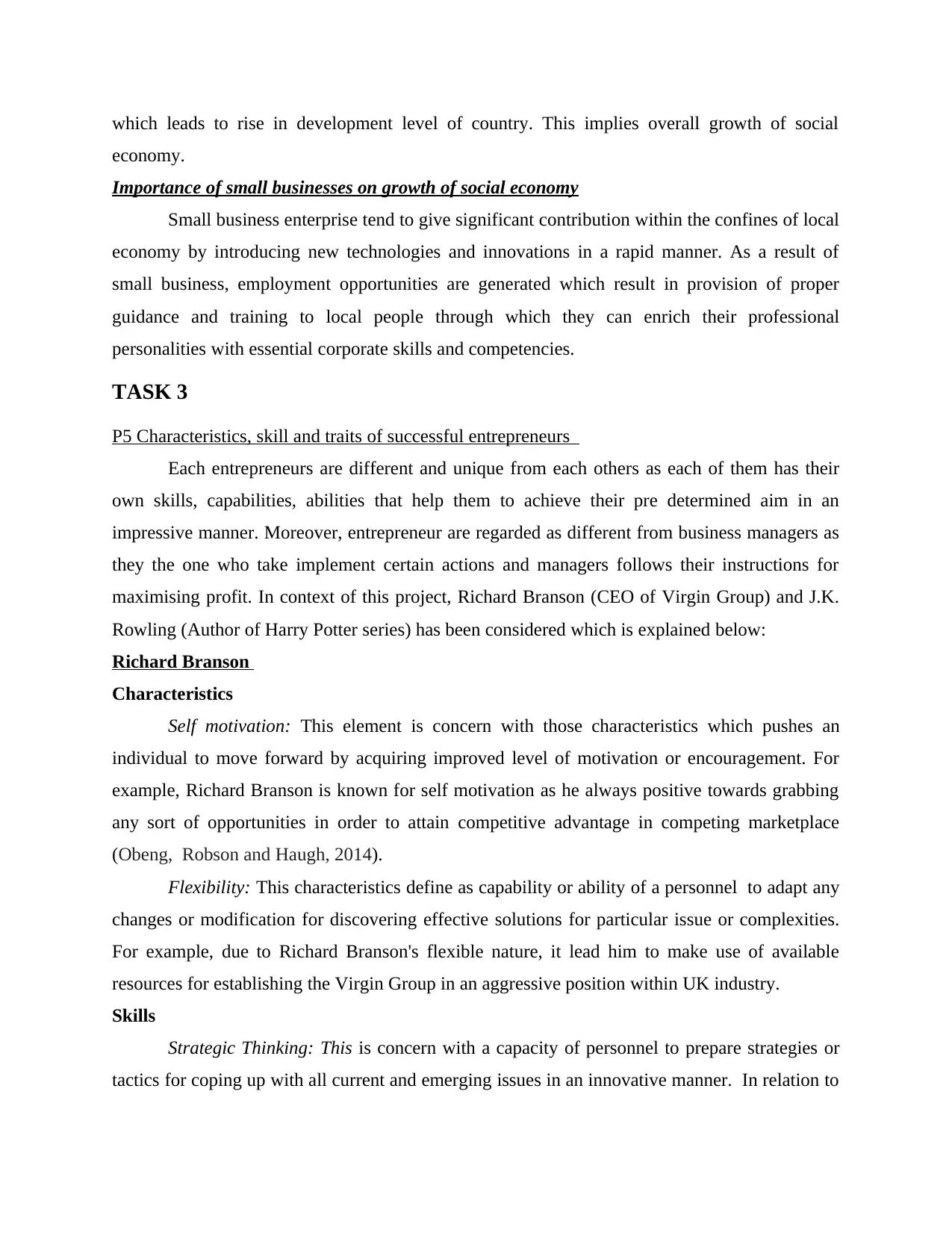
which leads to rise in development level of country. This implies overall growth of social
economy.
Importance of small businesses on growth of social economy
Small business enterprise tend to give significant contribution within the confines of local
economy by introducing new technologies and innovations in a rapid manner. As a result of
small business, employment opportunities are generated which result in provision of proper
guidance and training to local people through which they can enrich their professional
personalities with essential corporate skills and competencies.
TASK 3
P5 Characteristics, skill and traits of successful entrepreneurs
Each entrepreneurs are different and unique from each others as each of them has their
own skills, capabilities, abilities that help them to achieve their pre determined aim in an
impressive manner. Moreover, entrepreneur are regarded as different from business managers as
they the one who take implement certain actions and managers follows their instructions for
maximising profit. In context of this project, Richard Branson (CEO of Virgin Group) and J.K.
Rowling (Author of Harry Potter series) has been considered which is explained below:
Richard Branson
Characteristics
Self motivation: This element is concern with those characteristics which pushes an
individual to move forward by acquiring improved level of motivation or encouragement. For
example, Richard Branson is known for self motivation as he always positive towards grabbing
any sort of opportunities in order to attain competitive advantage in competing marketplace
(Obeng, Robson and Haugh, 2014).
Flexibility: This characteristics define as capability or ability of a personnel to adapt any
changes or modification for discovering effective solutions for particular issue or complexities.
For example, due to Richard Branson's flexible nature, it lead him to make use of available
resources for establishing the Virgin Group in an aggressive position within UK industry.
Skills
Strategic Thinking: This is concern with a capacity of personnel to prepare strategies or
tactics for coping up with all current and emerging issues in an innovative manner. In relation to
economy.
Importance of small businesses on growth of social economy
Small business enterprise tend to give significant contribution within the confines of local
economy by introducing new technologies and innovations in a rapid manner. As a result of
small business, employment opportunities are generated which result in provision of proper
guidance and training to local people through which they can enrich their professional
personalities with essential corporate skills and competencies.
TASK 3
P5 Characteristics, skill and traits of successful entrepreneurs
Each entrepreneurs are different and unique from each others as each of them has their
own skills, capabilities, abilities that help them to achieve their pre determined aim in an
impressive manner. Moreover, entrepreneur are regarded as different from business managers as
they the one who take implement certain actions and managers follows their instructions for
maximising profit. In context of this project, Richard Branson (CEO of Virgin Group) and J.K.
Rowling (Author of Harry Potter series) has been considered which is explained below:
Richard Branson
Characteristics
Self motivation: This element is concern with those characteristics which pushes an
individual to move forward by acquiring improved level of motivation or encouragement. For
example, Richard Branson is known for self motivation as he always positive towards grabbing
any sort of opportunities in order to attain competitive advantage in competing marketplace
(Obeng, Robson and Haugh, 2014).
Flexibility: This characteristics define as capability or ability of a personnel to adapt any
changes or modification for discovering effective solutions for particular issue or complexities.
For example, due to Richard Branson's flexible nature, it lead him to make use of available
resources for establishing the Virgin Group in an aggressive position within UK industry.
Skills
Strategic Thinking: This is concern with a capacity of personnel to prepare strategies or
tactics for coping up with all current and emerging issues in an innovative manner. In relation to
⊘ This is a preview!⊘
Do you want full access?
Subscribe today to unlock all pages.

Trusted by 1+ million students worldwide
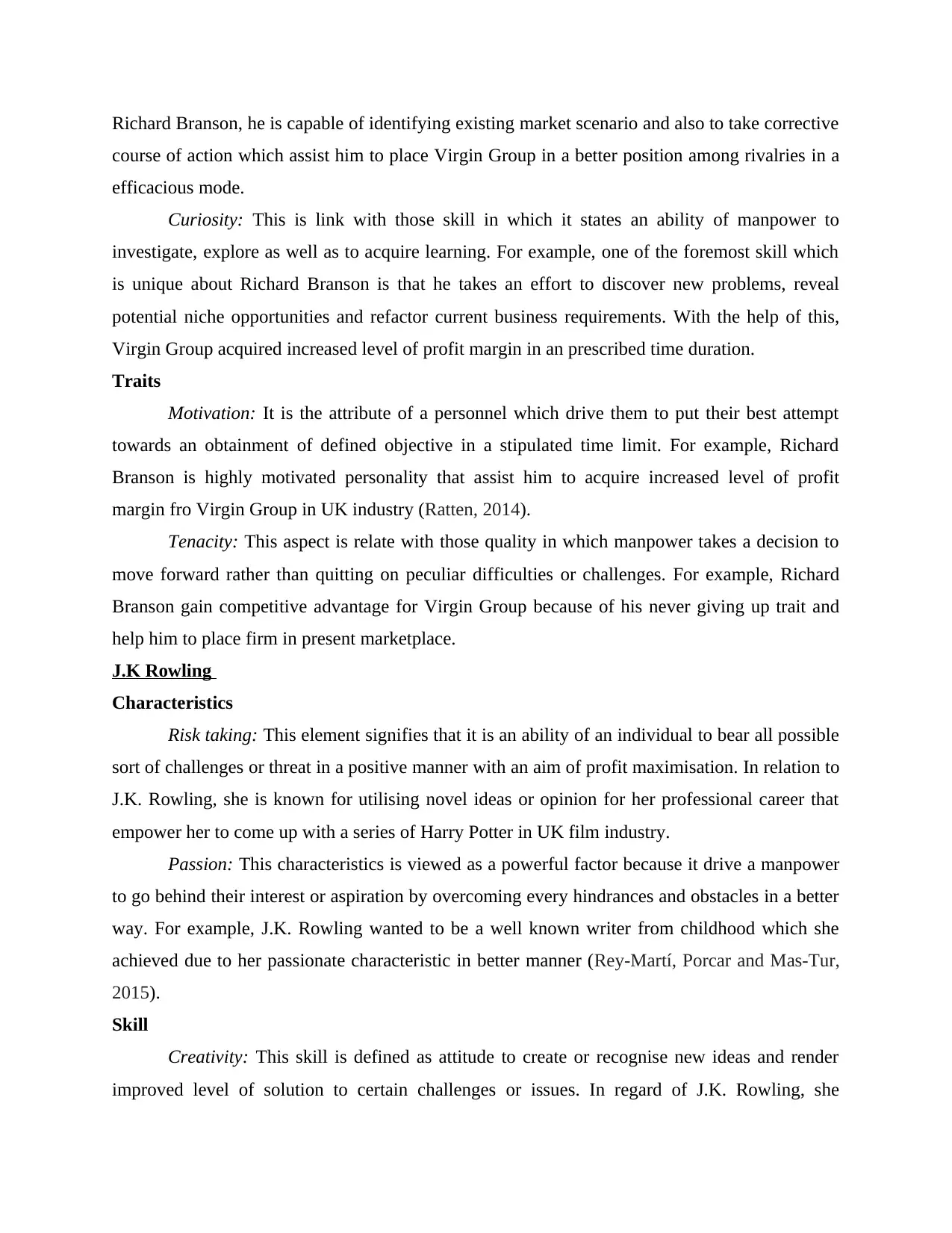
Richard Branson, he is capable of identifying existing market scenario and also to take corrective
course of action which assist him to place Virgin Group in a better position among rivalries in a
efficacious mode.
Curiosity: This is link with those skill in which it states an ability of manpower to
investigate, explore as well as to acquire learning. For example, one of the foremost skill which
is unique about Richard Branson is that he takes an effort to discover new problems, reveal
potential niche opportunities and refactor current business requirements. With the help of this,
Virgin Group acquired increased level of profit margin in an prescribed time duration.
Traits
Motivation: It is the attribute of a personnel which drive them to put their best attempt
towards an obtainment of defined objective in a stipulated time limit. For example, Richard
Branson is highly motivated personality that assist him to acquire increased level of profit
margin fro Virgin Group in UK industry (Ratten, 2014).
Tenacity: This aspect is relate with those quality in which manpower takes a decision to
move forward rather than quitting on peculiar difficulties or challenges. For example, Richard
Branson gain competitive advantage for Virgin Group because of his never giving up trait and
help him to place firm in present marketplace.
J.K Rowling
Characteristics
Risk taking: This element signifies that it is an ability of an individual to bear all possible
sort of challenges or threat in a positive manner with an aim of profit maximisation. In relation to
J.K. Rowling, she is known for utilising novel ideas or opinion for her professional career that
empower her to come up with a series of Harry Potter in UK film industry.
Passion: This characteristics is viewed as a powerful factor because it drive a manpower
to go behind their interest or aspiration by overcoming every hindrances and obstacles in a better
way. For example, J.K. Rowling wanted to be a well known writer from childhood which she
achieved due to her passionate characteristic in better manner (Rey-Martí, Porcar and Mas-Tur,
2015).
Skill
Creativity: This skill is defined as attitude to create or recognise new ideas and render
improved level of solution to certain challenges or issues. In regard of J.K. Rowling, she
course of action which assist him to place Virgin Group in a better position among rivalries in a
efficacious mode.
Curiosity: This is link with those skill in which it states an ability of manpower to
investigate, explore as well as to acquire learning. For example, one of the foremost skill which
is unique about Richard Branson is that he takes an effort to discover new problems, reveal
potential niche opportunities and refactor current business requirements. With the help of this,
Virgin Group acquired increased level of profit margin in an prescribed time duration.
Traits
Motivation: It is the attribute of a personnel which drive them to put their best attempt
towards an obtainment of defined objective in a stipulated time limit. For example, Richard
Branson is highly motivated personality that assist him to acquire increased level of profit
margin fro Virgin Group in UK industry (Ratten, 2014).
Tenacity: This aspect is relate with those quality in which manpower takes a decision to
move forward rather than quitting on peculiar difficulties or challenges. For example, Richard
Branson gain competitive advantage for Virgin Group because of his never giving up trait and
help him to place firm in present marketplace.
J.K Rowling
Characteristics
Risk taking: This element signifies that it is an ability of an individual to bear all possible
sort of challenges or threat in a positive manner with an aim of profit maximisation. In relation to
J.K. Rowling, she is known for utilising novel ideas or opinion for her professional career that
empower her to come up with a series of Harry Potter in UK film industry.
Passion: This characteristics is viewed as a powerful factor because it drive a manpower
to go behind their interest or aspiration by overcoming every hindrances and obstacles in a better
way. For example, J.K. Rowling wanted to be a well known writer from childhood which she
achieved due to her passionate characteristic in better manner (Rey-Martí, Porcar and Mas-Tur,
2015).
Skill
Creativity: This skill is defined as attitude to create or recognise new ideas and render
improved level of solution to certain challenges or issues. In regard of J.K. Rowling, she
Paraphrase This Document
Need a fresh take? Get an instant paraphrase of this document with our AI Paraphraser
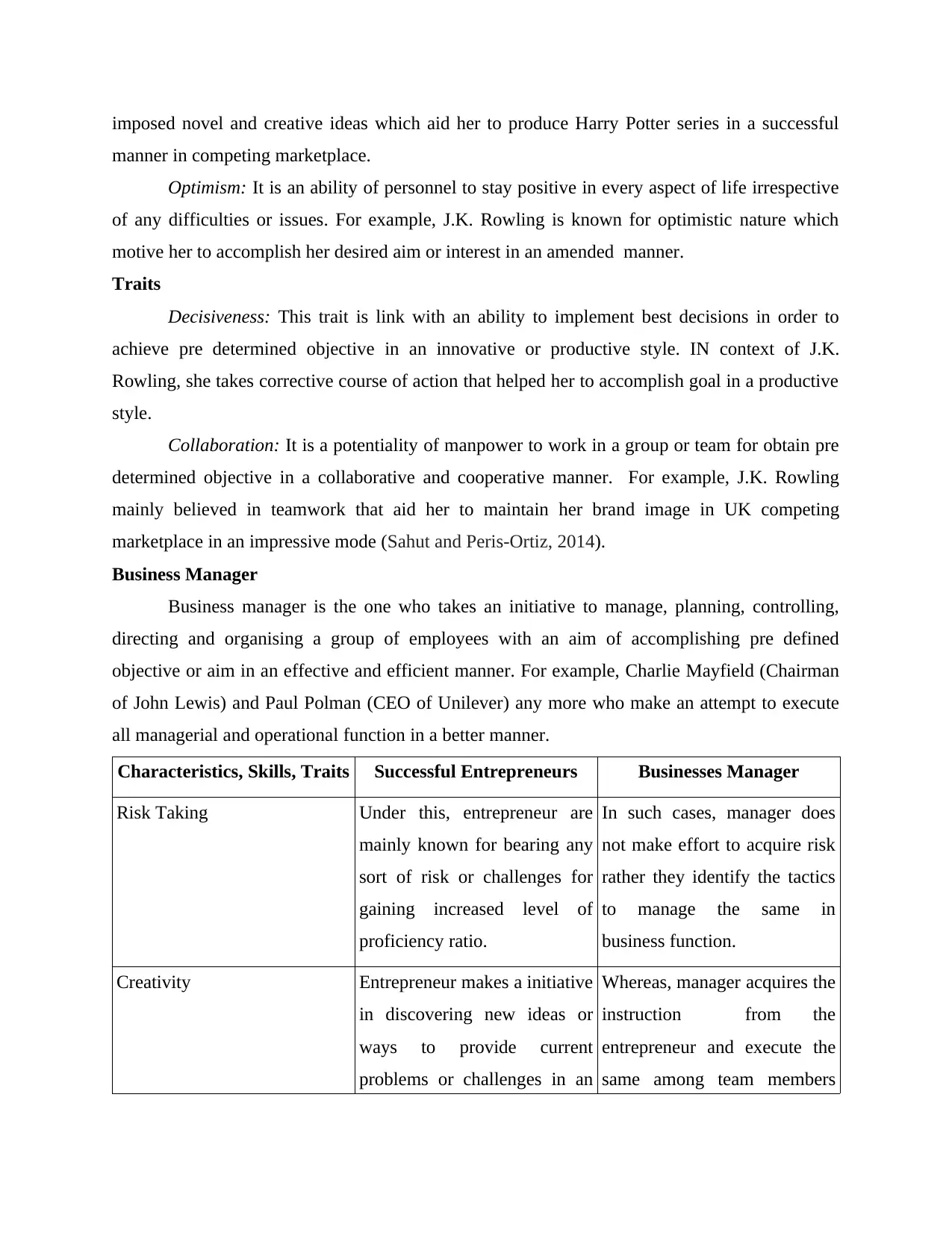
imposed novel and creative ideas which aid her to produce Harry Potter series in a successful
manner in competing marketplace.
Optimism: It is an ability of personnel to stay positive in every aspect of life irrespective
of any difficulties or issues. For example, J.K. Rowling is known for optimistic nature which
motive her to accomplish her desired aim or interest in an amended manner.
Traits
Decisiveness: This trait is link with an ability to implement best decisions in order to
achieve pre determined objective in an innovative or productive style. IN context of J.K.
Rowling, she takes corrective course of action that helped her to accomplish goal in a productive
style.
Collaboration: It is a potentiality of manpower to work in a group or team for obtain pre
determined objective in a collaborative and cooperative manner. For example, J.K. Rowling
mainly believed in teamwork that aid her to maintain her brand image in UK competing
marketplace in an impressive mode (Sahut and Peris-Ortiz, 2014).
Business Manager
Business manager is the one who takes an initiative to manage, planning, controlling,
directing and organising a group of employees with an aim of accomplishing pre defined
objective or aim in an effective and efficient manner. For example, Charlie Mayfield (Chairman
of John Lewis) and Paul Polman (CEO of Unilever) any more who make an attempt to execute
all managerial and operational function in a better manner.
Characteristics, Skills, Traits Successful Entrepreneurs Businesses Manager
Risk Taking Under this, entrepreneur are
mainly known for bearing any
sort of risk or challenges for
gaining increased level of
proficiency ratio.
In such cases, manager does
not make effort to acquire risk
rather they identify the tactics
to manage the same in
business function.
Creativity Entrepreneur makes a initiative
in discovering new ideas or
ways to provide current
problems or challenges in an
Whereas, manager acquires the
instruction from the
entrepreneur and execute the
same among team members
manner in competing marketplace.
Optimism: It is an ability of personnel to stay positive in every aspect of life irrespective
of any difficulties or issues. For example, J.K. Rowling is known for optimistic nature which
motive her to accomplish her desired aim or interest in an amended manner.
Traits
Decisiveness: This trait is link with an ability to implement best decisions in order to
achieve pre determined objective in an innovative or productive style. IN context of J.K.
Rowling, she takes corrective course of action that helped her to accomplish goal in a productive
style.
Collaboration: It is a potentiality of manpower to work in a group or team for obtain pre
determined objective in a collaborative and cooperative manner. For example, J.K. Rowling
mainly believed in teamwork that aid her to maintain her brand image in UK competing
marketplace in an impressive mode (Sahut and Peris-Ortiz, 2014).
Business Manager
Business manager is the one who takes an initiative to manage, planning, controlling,
directing and organising a group of employees with an aim of accomplishing pre defined
objective or aim in an effective and efficient manner. For example, Charlie Mayfield (Chairman
of John Lewis) and Paul Polman (CEO of Unilever) any more who make an attempt to execute
all managerial and operational function in a better manner.
Characteristics, Skills, Traits Successful Entrepreneurs Businesses Manager
Risk Taking Under this, entrepreneur are
mainly known for bearing any
sort of risk or challenges for
gaining increased level of
proficiency ratio.
In such cases, manager does
not make effort to acquire risk
rather they identify the tactics
to manage the same in
business function.
Creativity Entrepreneur makes a initiative
in discovering new ideas or
ways to provide current
problems or challenges in an
Whereas, manager acquires the
instruction from the
entrepreneur and execute the
same among team members
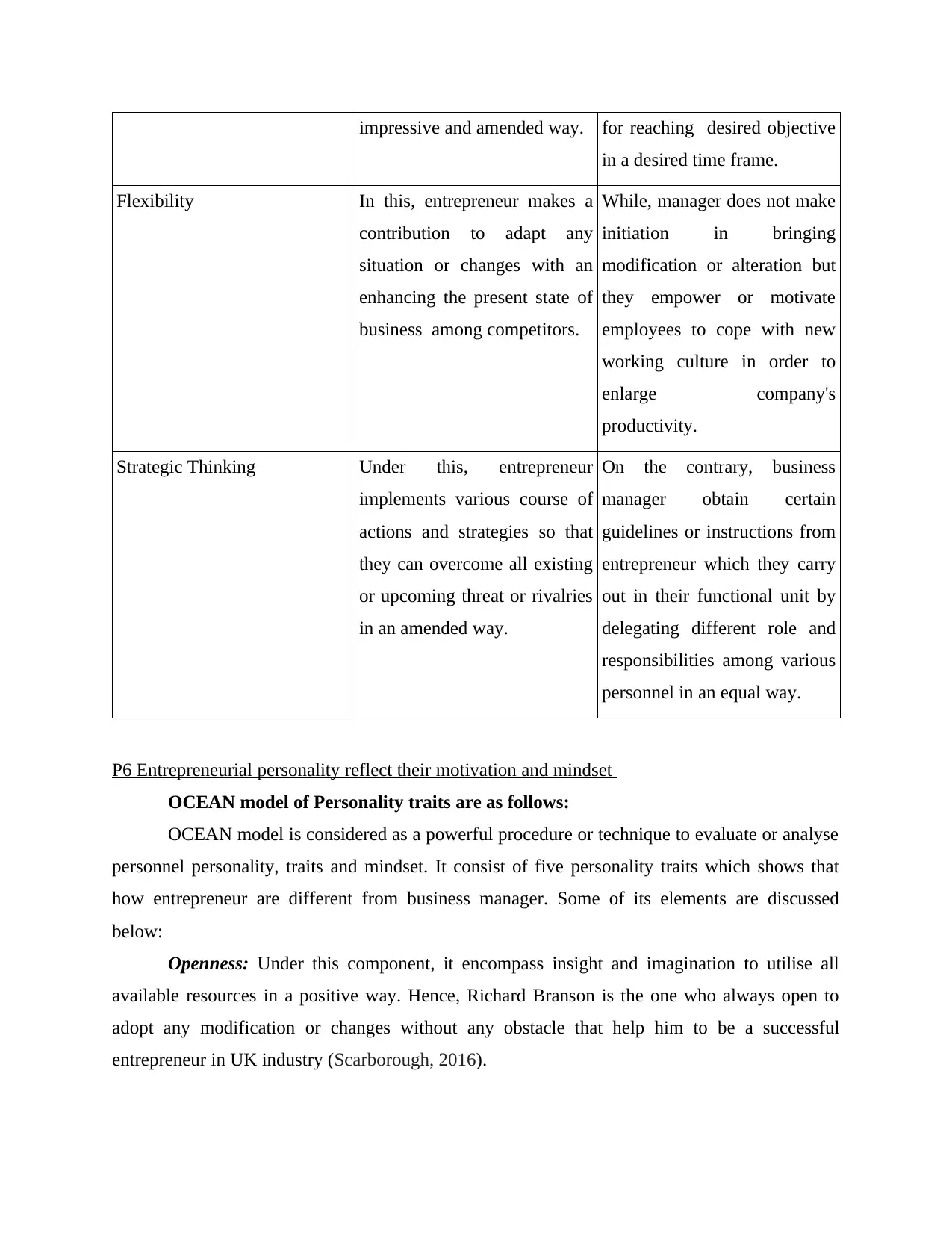
impressive and amended way. for reaching desired objective
in a desired time frame.
Flexibility In this, entrepreneur makes a
contribution to adapt any
situation or changes with an
enhancing the present state of
business among competitors.
While, manager does not make
initiation in bringing
modification or alteration but
they empower or motivate
employees to cope with new
working culture in order to
enlarge company's
productivity.
Strategic Thinking Under this, entrepreneur
implements various course of
actions and strategies so that
they can overcome all existing
or upcoming threat or rivalries
in an amended way.
On the contrary, business
manager obtain certain
guidelines or instructions from
entrepreneur which they carry
out in their functional unit by
delegating different role and
responsibilities among various
personnel in an equal way.
P6 Entrepreneurial personality reflect their motivation and mindset
OCEAN model of Personality traits are as follows:
OCEAN model is considered as a powerful procedure or technique to evaluate or analyse
personnel personality, traits and mindset. It consist of five personality traits which shows that
how entrepreneur are different from business manager. Some of its elements are discussed
below:
Openness: Under this component, it encompass insight and imagination to utilise all
available resources in a positive way. Hence, Richard Branson is the one who always open to
adopt any modification or changes without any obstacle that help him to be a successful
entrepreneur in UK industry (Scarborough, 2016).
in a desired time frame.
Flexibility In this, entrepreneur makes a
contribution to adapt any
situation or changes with an
enhancing the present state of
business among competitors.
While, manager does not make
initiation in bringing
modification or alteration but
they empower or motivate
employees to cope with new
working culture in order to
enlarge company's
productivity.
Strategic Thinking Under this, entrepreneur
implements various course of
actions and strategies so that
they can overcome all existing
or upcoming threat or rivalries
in an amended way.
On the contrary, business
manager obtain certain
guidelines or instructions from
entrepreneur which they carry
out in their functional unit by
delegating different role and
responsibilities among various
personnel in an equal way.
P6 Entrepreneurial personality reflect their motivation and mindset
OCEAN model of Personality traits are as follows:
OCEAN model is considered as a powerful procedure or technique to evaluate or analyse
personnel personality, traits and mindset. It consist of five personality traits which shows that
how entrepreneur are different from business manager. Some of its elements are discussed
below:
Openness: Under this component, it encompass insight and imagination to utilise all
available resources in a positive way. Hence, Richard Branson is the one who always open to
adopt any modification or changes without any obstacle that help him to be a successful
entrepreneur in UK industry (Scarborough, 2016).
⊘ This is a preview!⊘
Do you want full access?
Subscribe today to unlock all pages.

Trusted by 1+ million students worldwide
1 out of 16
Related Documents
Your All-in-One AI-Powered Toolkit for Academic Success.
+13062052269
info@desklib.com
Available 24*7 on WhatsApp / Email
![[object Object]](/_next/static/media/star-bottom.7253800d.svg)
Unlock your academic potential
Copyright © 2020–2026 A2Z Services. All Rights Reserved. Developed and managed by ZUCOL.





